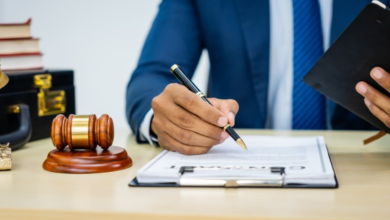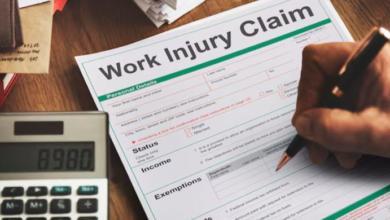What to Do Right After a Personal Injury Accident

Table of Contents
- Ensure Safety and Call for Help
- Seek Immediate Medical Attention
- Document the Accident Scene
- Collect Witness Information
- Notify Your Insurance Company
- Keep Detailed Records
- Understand Your Legal Rights
Ensure Safety and Call for Help
Your most important concern should be your safety and everyone else involved. Assess the situation to determine immediate dangers and move to a safe location if necessary. Call emergency services immediately to get professional help on the scene. It’s imperative to make sure everyone is out of harm’s way before addressing any further steps. The adrenaline and shock post-accident can sometimes cloud your judgment, making it essential to have emergency responders assess the scene and provide immediate assistance.
Seek Immediate Medical Attention
Even if you feel perfectly fine after the accident, seeking medical attention right away is crucial. Injuries from accidents can sometimes be hidden and manifest later. Specific injuries like traumatic brain injuries might not show immediate symptoms. A professional medical evaluation ensures that all injuries are thoroughly documented, which is essential for future claims. This documentation can be beneficial if you seek legal assistance from professionals like those at https://injurylawpartners.com/. Medical records not only serve to treat your injuries but also create a timeline of events that can be crucial if legal issues arise. Moreover, insurers and legal authorities often look at the immediacy and thoroughness of medical care following an accident as indicators of the injury’s severity.
Document the Accident Scene
Detailed documentation is valuable for insurance claims and any potential legal actions. Clear and comprehensive photos can capture the accident’s immediate aftermath, which might fade from memory over time. Videos can also provide dynamic insights that still images may miss. Remember to use multiple angles and distances to cover the full scope of the incident. This multi-perspective documentation can corroborate your account and counter any disputes. A smartphone can be compelling since you can easily store and share the collected evidence.
Items to Document
- Positions of any vehicles involved
- Any visible damage to vehicles or property
- Road conditions, weather, and any traffic signs or signals
- Visible injuries to any parties involved
Furthermore, having a dashcam can help comprehend the events that led to the accident. Dashcams are increasingly being used to provide impartial evidence in traffic incidents, making them invaluable assets in disputes.
Collect Witness Information
If there are any witnesses, collect their contact information and statements. Witnesses can offer an impartial description of the incident, particularly helpful in case there are disagreements about the circumstances preceding the accident. A diverse pool of witnesses can offer a more holistic view of the incident, strengthening your case and being more credible. Ensure to note their contact details, such as phone numbers and email addresses. In some cases, witnesses might be reluctant to get involved, but explaining the importance of their testimony can often help in soliciting their cooperation. Witness statements gathered immediately after the event are generally considered more reliable since they are made while the incident is still fresh in their minds.
Notify Your Insurance Company
Contact your insurance company as soon as possible to report the accident. Please provide them with all the necessary details and documentation you’ve collected. Ensure that your descriptions are truthful and precise to prevent complications in the future. Your policy likely has specific requirements for time frames and the type of information you need to provide, so read through it carefully and follow the guidelines to maintain your coverage. While contacting your insurance company, remain factual and avoid speculating or admitting fault until the situation is thoroughly evaluated. Properly presenting your case ensures that your claim process goes smoothly and helps you to receive any compensation you may be entitled to. Additionally, keeping a copy of all correspondence with your insurer can serve as a valuable record to track the progress of your claim.
Read more: Beautiful Lighting Design: Elevate Your Home with Lanterns
Keep Detailed Records
Keep a thorough record of all paperwork regarding the incident, such as medical invoices, repair receipts, and interactions with insurance providers. It helps to have everything organized and easily accessible when needed. Starting in an organized manner can save you time and stress and facilitate legal professionals to help you if required. Keeping a chronological log of events related to the accident will further fortify your records. This log can include notes from conversations, follow-up appointments, and any changes in your physical or emotional state. Digitally scanning these documents and storing them in a secure cloud service ensures they’re safe from physical damage and easily shareable when needed.
Key Documents to Keep
- Medical reports and bills
- Repair estimates and receipts
- Police reports and accident documentation
- Insurance company correspondence
- Legal documents, if applicable
These records are often the foundation for potential legal claims or insurance settlements. Keeping them meticulously can expedite various processes and provide peace of mind during otherwise stressful times.
Understand Your Legal Rights
Knowing your legal rights can significantly impact the outcome of your case. Understanding vehicle safety regulations and laws can aid you in making informed decisions post-accident. Seeking advice from a specialist can assist you in understanding the intricacies of personal injury law and guarantee appropriate compensation. A legal professional can offer customized guidance that considers the particulars of your situation, leading you through the complexities of paperwork and legal requirements. It is advisable to seek a free consultation, which many law firms offer, to understand your options better. The attorney can handle the complex details and processes, enabling you to concentrate on improving.




